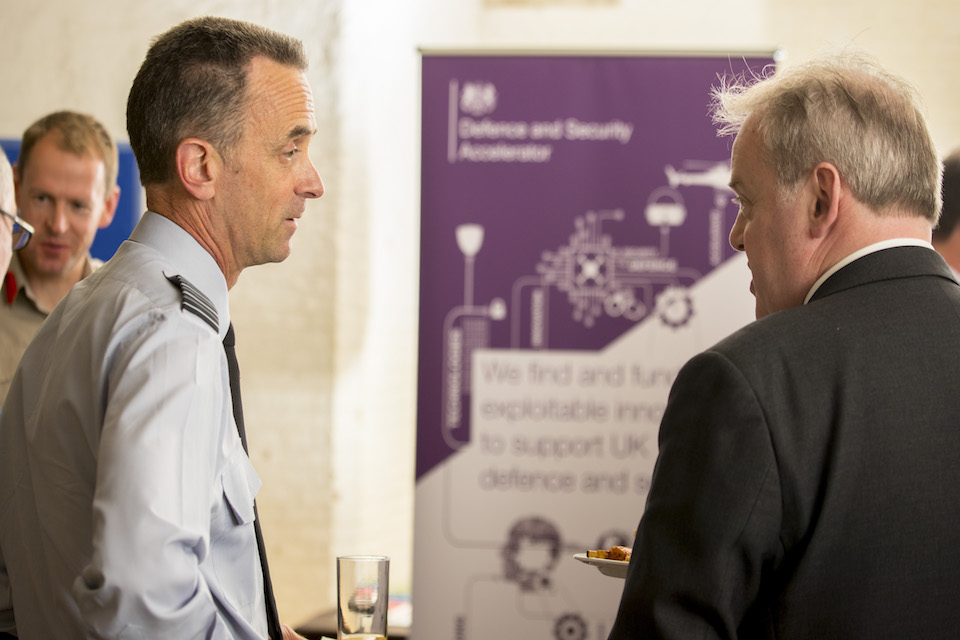News story: Flagship AI Lab announced as Defence Secretary hosts first meet between British and American defence innovators
As part of the MOD’s commitment to pursue and deliver future capabilities, the Defence Secretary announced the launch of AI Lab – a single flagship for Artificial Intelligence, machine learning and data science in defence based at Dstl in Porton Down. AI Lab will enhance and accelerate the UK’s world-class capability in the application of AI-related technologies to defence and security challenges. Dstl currently delivers more than £20 million of research related to AI and this is forecast to grow significantly.
AI Lab will engage in high-level research on areas from autonomous vehicles to intelligent systems; from countering fake news to using information to deter and de-escalate conflicts; and from enhanced computer network defences to improved decision aids for commanders. AI Lab provides tremendous opportunities to help keep the British public safe from a range of defence and security threats. This new creation will help Dstl contribute more fully to this vital challenge.
Yesterday’s meetings provided the US Defense Innovation Board, a team of experts from across defence and industry, with an opportunity to meet with UK defence leaders to share experiences and innovation priorities. This co-operation further strengthens the excellent relationship between our militaries.
The team of American experts includes notable figures who have led transformative change in government or are acutely aware of the challenges the Department of Defense faces. Members include: Dr Eric E. Schmidt, former chair of Google Inc; Dr. J. Michael McQuade Ph.D, Senior Vice President for Science and Technology at United Technologies; and Sally Donnelly, former Senior Advisor to the Secretary of Defense.
Defence Secretary Gavin Williamson said:
The relationship we have with our American partners is indispensable to both our nations. In the face of evolving global threats, we must harness new technologies and approaches to stay ahead of our adversaries and keep us safe.
Today’s meeting of military and scientific minds from both sides of the Atlantic encourages our best and brightest to develop new capabilities in everything from Artificial Intelligence and autonomous weapons to advanced cyber and robotics.
Building upon this hugely important area of research, the Defence Secretary also announced a reciprocal UK Defence Innovation Board visit to the US later this year which will develop joint recommendations based on the needs of the MOD and its American partners.

The UK’s Defence External Advisory Panel published findings from their independent report which examines how the MOD can become ‘innovative by instinct’. The report highlighted a requirement to expand capabilities in cyber defence and information technology systems but also the need to streamline procurement processes and the implementation of ground-breaking abilities.
As the MOD carries out the Modernising Defence Programme review, US counterparts are also examining how to strengthen their armed forces in the face of intensifying threats. In a rapidly changing world, military planning must be agile to counter emerging challenges and the MOD must consult widely with our closest allies.
Defence Minister Guto Bebb said:
UK defence has always been at the forefront of significant technological advances, from the development of radar systems crucial to our victory in the Battle of Britain to our Harrier jump jets which revolutionised our air capabilities in the Falkland and Iraq wars.
The UK has invested £800 million on boosting innovation over the next decade to meet future threats. This coupled with our close working relationships with allies provides us with the opportunity to maintain our military advantage for decades to come.
Note to editors:
- The US Defense Innovation Board is made up of leading experts from business, civil society and the military and broadly mirrors the work of the British team.
- The Defence Innovation External Advisory Panel was established, and met for the first time in July 2017.
- The Panel provides independent challenge as the members seek to interrogate MOD’s current innovation ecosystem and help ensure that the Department is driving the right change at the necessary pace to meet its future goals. To support this challenge function, the Panel were asked to provide an annual report to Secretary of State for Defence on their findings. This is the first of these reports.
- The Defence and Science and Technology Laboratory (Dstl) works to apply cutting-edge science and technology (S&T) to keep UK armed forces, and the British people, protected from harm.
- Dstl is an Executive Agency of the MOD, run along commercial lines. It is one of the principal government organisations dedicated to S&T in the defence and security field, with six sites; at Porton Down, Portsdown West, Fort Halstead, Sandridge, Langhurst and Alverstoke.
- Dstl works with a wide range of partners and suppliers in industry, academia and overseas.
For more information contact the MOD News Desk on 0207 218 7907.